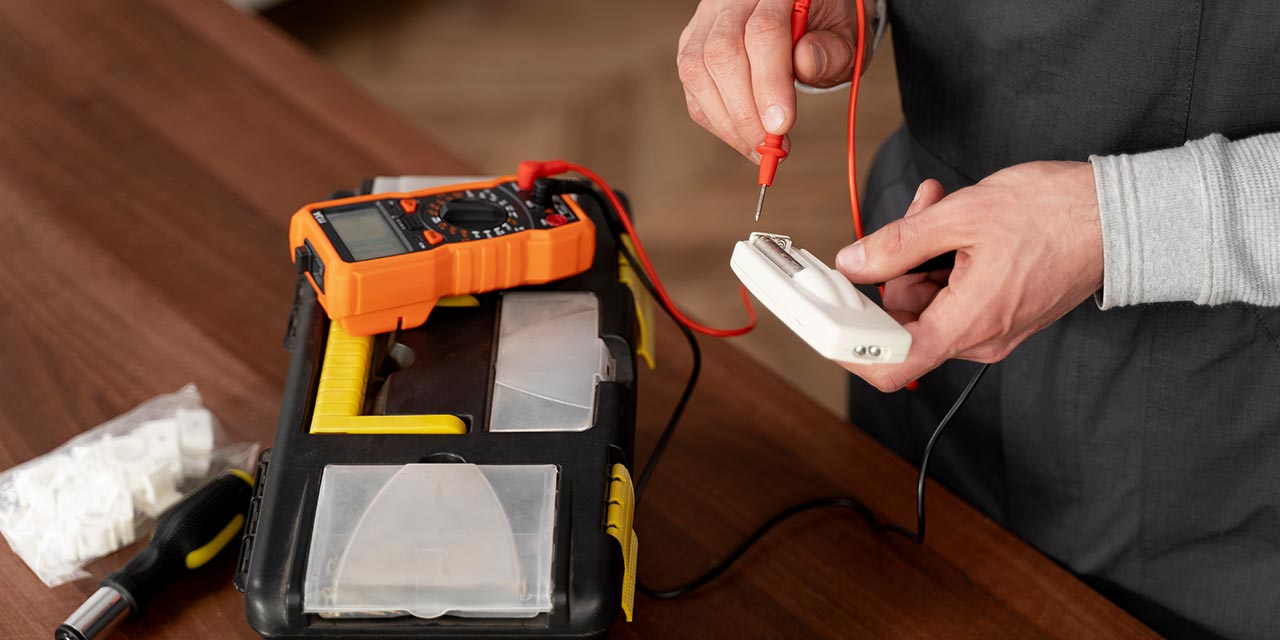Preventing your home from hazards like electrical arcing should be a top priority to ensure its safety and longevity. A proactive approach to avoid electrical arcing requires understanding its causes and implementing safety measures, including regular inspections and AFCI installation.
In this blog, we will discuss electrical arcing in detail, covering its signs, causes, and prevention strategies to help you better understand and avoid electrical arcing hazards. Let’s get started!
What is Electrical Arcing?
Electrical arcing is a discharge of electric current that forms a bright path across a gap in a circuit or between two conductors. It is often accompanied by sparks, flashes, loud noises, and potentially fires.
Along with the aforementioned signs, functional issues such as equipment malfunctioning or stopping working may also indicate electrical arcing.
Electrical arcing is dangerous and can lead to fires, damage to electrical components, and personal injury, including burns. Understanding the underlying causes of arcing can help you take the required steps to prevent it.
Causes of Electric Arcing
So what causes electrical arcing in homes? Well, anything that can interrupt the normal flow of electricity and force it to travel outside its intended path can lead to arcing. In residential settings, it can stem from various issues, including:
Use of Damaged Electrical Equipment
Using damaged equipment, including faulty appliances, worn-out outlets, or damaged cords can lead to arcing and other electrical hazards.
Faulty Wiring or Loose Connections
Improperly tightened wires in an outlet or fixture can become loose over time due to vibration or thermal expansion, causing a gap where electricity can arc across.
Corrosion
Corrosion degrades the integrity of electrical components, potentially leading to increased resistance and heat, which can eventually result in an arc flash.
Dust
Dust accumulation can act as a conductive material between electrical components, allowing electrical current to flow through unintended paths, potentially causing arcing.
Damaged Insulation
Worn or frayed insulation on wires can expose conductors, leading to electric shock, short circuits, arcing, and potential fires.
Damaged Electrical Panel
Faulty breakers, damaged panels, or overloaded circuits can cause arcing due to improper current flow.
Environmental Factors
Moisture, high temperatures, and corrosive environments can accelerate the deterioration of electrical components, leading to electrical arcing.
Human Error
Improper installation, handling, or maintenance of electrical equipment by humans can contribute to arcing situations.
By taking preventative measures to address the above issues that could lead to electrical arcing, you can greatly minimize the chances of an electrical arc occurring in your home.
Practical Tips to Prevent Electrical Arcing in Your Home
Here are some effective preventive measures that can help significantly reduce the risk of electrical arcing and potential fires in your home.
Schedule Regular Electrical Inspections
Regular electrical inspection is essential to keep your home’s electrical system safe and properly functional. Periodic inspection will help identify potential hazards before they escalate into serious issues like electrical arcing. So make sure to have a licensed electrician inspect your electrical system periodically to keep your home safe from arcing and other electrical hazards.
Install Arc Fault Circuit Interrupters
An Arc Fault Circuit Interrupter (AFCI) is a safety device that can help avoid arcing hazards like electrical fires in your home. AFCIs continuously monitor electricity flowing through your house and easily detect abnormal arcing patterns. When AFCI detects a dangerous electric arc, it quickly cuts off the power to the circuit, preventing the arc from continuing and potentially starting a fire.
The NEC also requires new or modified branch circuits in kitchens, living rooms, bedrooms, and certain other areas in your home to be protected by an Arc Fault Circuit Interrupter. So ensure your home’s electrical panel has the required AFCI installed by a licensed electrician to prevent potential electrical fires caused by arcing faults.
Avoid Overloading Circuits
Overloading circuits can cause too much current to flow through the circuit, leading to overheating and melting of insulation. A damaged insulation then leads to electrical arcing. It’s recommended to have adequate outlets in your home and dedicated circuits for each electronic to avoid circuit overloads.
So avoid plugging too many appliances into a single outlet, use extension cords when required, and ensure your circuits are properly rated for the intended load. These safety measures will help you reduce the risk of electrical arcing.
Don't Misuse Extension Cords
Extension cords can be dangerous if misused, leading to overheating and potential arcing and electrical fires. While you can use appropriate extension cords at times, make sure you don’t depend on them as a permanent power source. If you are using extension cords more often, it is a sign that you need to have more outlets in your home by a professional to ensure electrical safety.
Keep Electrical Items Away from Water
Water is a good conductor of electricity. When it comes into contact with exposed electrical components, it can create a pathway for electricity to flow unexpectedly, leading to arcing. So keep your appliances and devices away from water to prevent electrical hazards.
Childproof Electrical Outlets
Children may not understand the dangers of electricity like adults do, so they may jeopardize their safety without knowing the hazards. For instance, if a child inserts any metal piece into an ordinary outlet, it can create a spark or arc between the object and the live electrical contact, leading to a potential fire. So it is necessary to ensure their safety by taking practical steps, including childproofing outlets.
One way to childproof outlets in your home is by using outlet covers. These covers create a physical barrier between the outlet's exposed terminals and anything that could potentially touch them. Thus, outlet covers can help you ensure your children and overall home safety by physically blocking access to the live electrical contacts within the outlet and preventing potential electrical arcing.
Ensure Your Electrician is Licensed
Electrical work, whether a small repair or complex installation, can pose serious hazards if not performed by a qualified professional. Therefore, hire a certified and licensed electrician for every electrical project in your home and avoid electrical hazards like arcing. A qualified electrician will ensure every addition, replacement, or modification to your electrical system is done safely according to codes, preventing potential electrical hazards.
Protect Your Home from Electrical Hazards with Randy’s Electric
Proactive maintenance like regular inspection and AFCI installation can help you reduce the risk of electrical arcing and other dangers. Make your home electrically safe by hiring Randy’s Electric’s licensed electrician for regular inspection. Our experts will help identify potential issues like loose connections, overloaded circuits, and damaged electrical components, and then repair or replace them. This will ensure proper functionality and prevent electrical hazards, including arcing and fires.
Contact Randy’s Electric to know how we can help you make your home safer and more functional.


